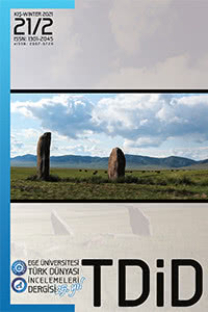A Study on Foreign Language Anxiety : The case of a Gagauzian and Turkish University
Anxiety, , Foreign Language Anxiety, , Foreign Language Learning, , Foreign Language Teaching
___
- Arnold Jane (1999): Affect in Language Learning. Cambridge: Cambridge University Press.
- Büyüköztürk. Ş. (2006). Soysal bilimler için veri analizi el kitabı, Ankara: Pegem Yayınları.
- Brown, A., Plonsky, L., &Teimouri, Y. (2018). The use of course grades as metrics in L2 research: A systematic review. ForeignLanguageAnnals, 51, 763–778.
- Chan Wai Meng, Chin KweeNyet, Bhatt Sunil, Walker Izumi (2012): Perspectives on Individual Characteristics and Foreign language Education. Boston: Walter de Gruyter.
- Elaldi, S. (2016). Foreign Language Anxiety of Students Studying English Language and Literature: A Sample from Turkey. Educational Research and Reviews, 11(6), 219-228.
- Ellis R. (1994). The study of second language acquisition. Oxford: OxfordUniversityPress.
- Ewald, J. D. (2007). Foreign language learning anxiety in upper‐level classes: Involving students as researchers. Foreign Language Annals, 40(1), 122-142.
- Field, A. P. (2016). Discovering statistics: The reality enigma. SAGE.
- Hashemi Masoud (2011): Language Stress and Anxiety Among the English Language Learners. In: Procedia - Social and Behavioral Sciences 30 (2011), pp. 1811 – 1816.
- He Deyuan (2018): Foreign Language Learning Anxiety. Singapore: Springer
- Heron, J. (1989). The facilitator‟s Handbook. London: KoganPage
- Heron, J. (1992). Feeling and Personhood: Psychology in Another Key. London: Sage
- Horwitz, E. K. (2001). Language anxiety and achievement. Annual Review of Applied Linguistics, 21 (1), pp. 112-126.
- Hu Ling, Wang Na (2014): Anxiety in Foreign language Learning. Online on: http://citeseerx.ist.psu.edu/viewdoc/download?doi=10.1.1.912.9185&rep=rep1&type=pdf, the last access 14.01.2020
- Jones, J. F. (2004): A cultural context for language anxiety. EA (English Australia) Journal, 21(2): pp. 30 -39
- Khattak, Z. I., Jamshed, T., Ahmad, A., &Baig, M. N. (2011). An investigation into the causes of English language learning anxiety in students at AWKUM. Procedia-Social and Behavioral Sciences, 15, 1600-1604.
- Kral’ovaZdena, Soradova Daniela (2015): Foreign Language earning Anxiety. In: Teaching Foreign Languages to Learners with Special Educational Needs. Pp. 91-100
- MacIntyre, P. D., & Gardner, R. C. (1991). Methods and results in the study of anxiety and language learning: A review of the literature. LanguageLearning, 41, pp. 85–117.
- Marwan, A. (2008). THE EXPLORATION OF FACTORS TRIGGERING FOREIGN LANGUAGE ANXIETY: LEARNERS'VOICE. Teflin Journal, 19(2), 119-126.
- Marwan, A. (2016). Investigating students’ foreign language anxiety. Malaysian Journal of ELT Research, 3(1), 19.
- Nakata Yoshiyki (2006): Motivation and Experience in Foreign Language Learning. Bern: Peter Lang Publishers.
- Oteir Ibrahim Naser, Al-Otaibi Abdullah Nijr (2019): Foreign Language Anxiety: A Systematic Review. In: Arab World English Journal (AWEJ) Volume 10. Number 3 September 2019, pp. 301-317
- Shabani Mohammad Bagher (2012): Levels and Sources of language Anxiety and Fear of Negative Evaluation among Iranian EFL Learners. In: Theory and Practice in Language Studies, Vol. 2, No. 11, pp. 2378-2383.
- Tabachnick, B.G. ve Fidell, L.S. (2013). Using Multivariate Statistics. Pearson, Boston.
- Tallon, M. (2009). Foreign language anxiety and heritage students of Spanish: A quantitative study. Foreign Language Annals, 42(1), 112-137.
- Tanveer Muhammad (2007): Investigation of the factors that cause language anxiety for ESL/EFL learners in learning speaking skills and the influence it casts on communication in the target language. Glasgow: University of Glasgow. Also online on https://www.researchgate.net/profile/Muhammad_Tanveer16/publication/293263722_Investigation_of_the_factors_that_cause_language_anxiety_for_ESLEFL_learners_in_learning_speaking_skills_and_the_influence_it_casts_on_communication_in_the_target_language/links/56b6f15408ae3c1b79ad4ce7.pdf, the last access 13/01.2020.
- Teimouri Yasser, Goetze Julia, Plonsky Luke (2019): Second Language Anxiety and Achievement. Studies in Second Language Acquisition 41 (2019), pp. 363–387.
- TothZsuzsa (2010): Foreign Language Anxiety and the Advanced Language Learner. Cambridge: Cambridge Scholars Publishing.
- Xiang Yang (2004): Attitude and Motivation in L2 Learning among UM Master Students. In: International Journal of management and Sustainability. 1(1), pp. 13-22
- Xu Fang (2011): Anxiety in EFL Listening Comprehension. In: Theory and Practice in Language Studies, Vol. 1, No. 12, pp. 1709-1717
- ISSN: 1301-2045
- Yayın Aralığı: 2
- Başlangıç: 1996
- Yayıncı: Ege Üniversitesi Türk Dünyası Araştırmaları Enstitüsü
Türk Lehçelerindeki /b-/>/m-/ Değişmesinin Fonetik Açıdan İncelenmesi
Kopuzdan “Telli Kur‘an”a Türklerde Kutsal Sazın Kültürel Serüveni
Fırat Nehri Kıyısındaki Türk Runik Yazıt: Dini Gerçekleri Denetlemede Güney Sibirya Yöntemi
Tatar Türkçesindeki Arapça Kökenli Kelimelerde Anlam Değişmeleri
A Study on Foreign Language Anxiety : The case of a Gagauzian and Turkish University
Fırat Nehri Kıyısındaki Türk Runik Yazıt Dini Gerçekleri Denetlemede Güney Sibirya Yöntemi
İgor L. KIZLASOV, Baktiyar BUTEYEV, Sinan YILDIRIM
Eski Uygur Türkçesi Metinlerinde Budist Bir Terim Olarak “Sadu (< Skr. Sādhu)”
Türk Lehçelerindeki /b-/>/m-/ Değişmesinin Fonetik Açıdan İncelenmesi
Kopuzdan “Telli Kur‘an”a Türklerde Sazın Kültürel Serüveni ve Kutsallığı
